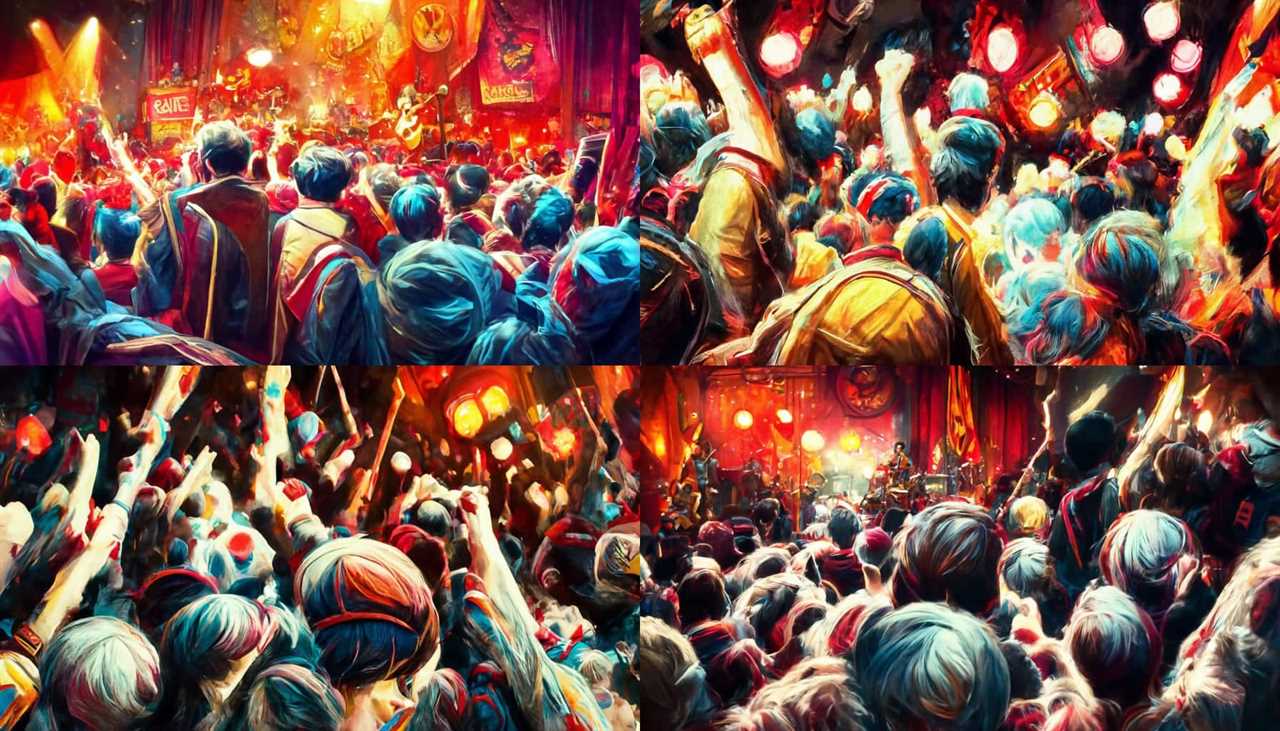AI in gaming creates immersive and adaptive experiences that draw you into rich game worlds. You'll notice non-playable characters (NPCs) behaving like real people, enhancing your interactions and making every journey feel unique. With procedural content generation, every playthrough offers something new, while adaptive systems adjust difficulty based on your skills. This means challenges stay fresh and exciting, catering specifically to your preferences. As AI technology evolves, expect even more realistic NPC conversations and dynamic environments. Stick around to see how these advancements are redefining the boundaries of gaming.
Key Takeaways
- AI enhances gameplay by enabling NPCs to exhibit human-like behaviors, deepening player immersion and interaction within game worlds.
- Procedural content generation creates unique environments for each playthrough, boosting replayability and fostering adaptive gameplay experiences.
- Dynamic difficulty adjustment tailors challenges to player performance, preventing frustration and ensuring engaging gameplay.
- Natural Language Processing allows spontaneous conversations with NPCs, enriching interactions and making game worlds more believable.
- AI-driven personalization aligns gameplay with player preferences, creating tailored adventures that resonate with individual interests and skill levels.
Understanding AI in Gaming
AI is revolutionizing the way you experience games, making them more immersive and engaging than ever before. This technology enhances gameplay by enabling non-player characters (NPCs) to act with intelligent, human-like behaviors.
You'll find that interactions within the game world feel more genuine, drawing you deeper into the story and environment. As AI technology continues to advance, it not only enhances gameplay but also contributes to AI-driven threat intelligence, guaranteeing that online gaming environments are secure and protected.
Rapid advancements in AI are transforming game development, allowing creators to generate characters, levels, and entire worlds efficiently. Procedural generation, powered by AI, guarantees every gaming session offers unique experiences, enhancing replayability and exploration.
You won't face the same challenges twice, keeping your adventures fresh and exciting.
Moreover, AI-driven adaptive systems adjust difficulty in real-time based on your performance, providing a personalized gameplay experience that matches your skill level. This dynamic approach means you'll never feel overwhelmed or bored, as the game continually adapts to keep you engaged.
Upcoming titles promise even more significant improvements in NPC conversations and interactions, further blurring the line between reality and imagination.
With AI at the forefront, the future of gaming is set to be more immersive, adaptive, and tailored just for you.
Impact on Gameplay and Development

AI transforms your gaming experience by personalizing gameplay to match your skill level and preferences.
With advancements in technology, the integration of AI software engineer jobs is essential in developing sophisticated algorithms that enhance player interaction.
With dynamic difficulty adjustment, the game adapts in real-time, keeping challenges fresh and engaging.
This means you get a tailored adventure every time you play, enhancing your enjoyment and satisfaction.
Personalized Gameplay Experiences
In today's gaming landscape, personalization is key to creating immersive experiences that resonate with players. By leveraging AI, developers can tailor gameplay experiences based on player behavior and preferences. This results in customized quests and mechanics that enhance your engagement and satisfaction.
| Feature | Impact on Players |
|---|---|
| Personalized Gameplay | Customized challenges based on your preferences |
| Adaptive Difficulty | Adjusts challenges in real-time for balanced play |
| Unique Game Environments | Generative AI creates evolving settings and narratives |
| Content Recommendations | Aligns with your interests for improved retention |
AI's adaptive difficulty guarantees that you face unique challenges suited to your skill level, keeping the gameplay balanced and motivating. Furthermore, with generative AI, the game environments and characters evolve with your choices, providing infinite replayability. By continuously refining gameplay through player analytics, developers enhance your experience while preventing overwhelming scenarios. Ultimately, this focus on personalized gameplay experiences not only boosts player engagement but also fosters a deeper connection with the game itself, making every session feel fresh and tailored just for you.
Dynamic Difficulty Adjustment
Dynamic Difficulty Adjustment (DDA) transforms the gaming experience by using real-time analysis to tailor challenges to your skill level. By leveraging AI algorithms, games can assess your performance as you play, dynamically adjusting the difficulty to keep you engaged.
For instance, in games like Left 4 Dead, the intensity of gameplay increases or decreases based on your actions, ensuring an immersive experience that feels just right. This adaptive approach mirrors strategies used in gout management insights to optimize individual health outcomes, highlighting the importance of personalized solutions.
This kind of dynamic difficulty adjustment considerably boosts player satisfaction. It prevents frustration and boredom by creating a personalized gameplay experience that matches your evolving skills. When you find the right balance of challenge, you're likely to enjoy longer play sessions and stick with the game.
Moreover, DDA doesn't just enhance your experience; it also streamlines game development. Developers can focus on content creation, knowing that AI-driven systems will manage difficulty levels without constant manual adjustments.
This allows for richer game worlds and deeper narratives that can adapt to any player's journey, making each session feel unique and tailored just for you.
NPC Behavior Innovation

NPC behavior has come a long way, and you're in for a treat with the latest innovations.
With dynamic interactions and realistic routines, you'll find that each character feels more alive than ever. This evolution in NPC design draws on advancements in AI applications in various industries, particularly in how AI can enhance user engagement.
Adaptive behavior algorithms guarantee that no two encounters are the same, keeping you on your toes as you navigate the game world.
Dynamic NPC Interactions
Imagine stepping into a game world where the characters you encounter feel as alive as your friends. With AI-driven NPCs, you can experience dynamic interactions that adapt to your actions. These characters learn from your choices, leading to more realistic behaviors and engaging experiences that keep you on your toes.
The rise of AI in gaming parallels the changes seen in the music industry, where technology also redefines creativity and engagement AI influences composition.
Thanks to advanced algorithms, NPCs develop unique routines, relationships, and personalities, resulting in a diverse cast that reacts in unexpected ways. For instance, in games like Red Dead Redemption 2, you'll notice how characters respond differently to various situations, adding layers of complexity to your gameplay.
Natural Language Processing (NLP) takes immersion to another level, allowing NPCs to engage in spontaneous conversations that enrich your role-playing adventures. When you speak to these characters, their responses feel personalized, making the world feel more alive.
As you navigate through these immersive environments, the AI behind the NPCs not only enhances their daily schedules and relationships but also guarantees that each encounter remains fresh and unpredictable.
This innovation in dynamic NPC interactions transforms your gaming experience into something truly adaptive and unforgettable.
Realistic Character Routines
In today's gaming landscape, players can expect non-player characters (NPCs) to behave more like real people, thanks to advanced AI algorithms. These AI-driven NPCs exhibit realistic character routines that mirror everyday activities, enhancing the immersive experience of the game world.
You'll notice how NPCs go about their lives, from fishing at the river to chatting with each other in town, making the environment feel dynamic and alive. This innovation in NPC behavior can even be likened to the exploration of how astrological signs influence perceived attractiveness, as both investigate the nuances of personality and engagement.
Moreover, these NPCs can develop unique personalities and relationships with you, creating engaging player interactions that evolve based on your choices. Games like Red Dead Redemption 2 demonstrate this unpredictability, where NPCs respond to your decisions and environmental changes.
This adaptability adds depth to gameplay, as you'll encounter varied challenges that require you to modify your strategies in real-time.
Natural Language Processing (NLP) further enriches this experience by allowing NPCs to engage in spontaneous conversations, making the role-playing feel natural and immersive.
As you investigate these innovative character routines, you'll discover how they contribute to a gaming experience that feels truly alive and responsive, transforming the way you connect with the game world.
Adaptive Behavior Algorithms
The evolution of NPC behavior has taken a significant leap with the introduction of adaptive behavior algorithms. These algorithms allow non-player characters (NPCs) to learn from player interactions, creating unique responses that enhance gameplay realism. Imagine NPCs that don't just react predictably but adapt to your style, making every encounter feel fresh and engaging.
| Feature | Description | Example Game |
|---|---|---|
| Adaptive Learning | NPCs learn from player actions | "Red Dead Redemption 2" |
| Diverse Personalities | Advanced neural networks create unique NPCs | "The Witcher 3" |
| Contextual Conversations | Natural Language Processing (NLP) enhances dialogue | "Cyberpunk 2077" |
With these innovations, NPCs can modify their strategies, resulting in more challenging and immersive gameplay. The combination of adaptive behavior algorithms and NLP fosters spontaneous conversations, further deepening player engagement with the narrative. In a dynamic gaming environment, these advancements revolutionize how players interact with characters, making every gaming experience richer and more memorable. Embrace the future of gaming, where NPCs truly come to life!
Procedural Content Generation

Procedural Content Generation (PCG) revolutionizes the way game environments and levels are created, allowing developers to craft unique experiences for each playthrough. By utilizing algorithmic design, PCG dynamically generates game environments in real-time, ensuring that no two gaming sessions are the same.
This technology not only enhances visual variety but also fosters adaptive gameplay, as you'll need to adjust your strategies based on the ever-changing landscape. Additionally, much like the innovative coffee offerings at Rising for People Coffee Co that appeal to busy consumers, PCG streamlines development processes, enabling quicker and more efficient content creation for game developers.
Games like No Man's Sky showcase the power of PCG by creating entire ecosystems filled with diverse landscapes, making exploration rewarding and engaging. With PCG, developers streamline their development process, reducing the manual input needed while producing visually stunning experiences.
Each session feels fresh, thanks to tailored content that reflects player preferences, ultimately boosting replayability.
As you immerse yourself in a game that employs procedural content generation, you can expect surprises at every turn, encouraging you to explore different strategies and approaches. This innovative method transforms your gaming experience, immersing you in a world that adapts to your decisions and keeps you coming back for more.
Personalizing Player Experiences

Personalizing player experiences has become a game-changer in how you engage with video games. With the use of AI, developers are now analyzing player data to create immersive adventures tailored just for you. This personalization guarantees that each gameplay experience is unique and engaging, adapting to your preferences and play style.
Understanding the psychological impact of gameplay on players, including aspects of narcissistic traits, can further enhance the design of these personalized experiences.
AI algorithms can dynamically adjust game difficulty in real-time, keeping the challenge balanced to enhance enjoyment without causing frustration. You'll find that as your skills develop, the game evolves alongside you, maintaining an enthralling experience.
Furthermore, AI-generated content, such as quests and in-game items, is customized to resonate with your interests, increasing your satisfaction and retention.
Continuous assessment of player behavior allows AI to identify patterns, providing targeted recommendations that further enrich your gaming experience. Additionally, emotion recognition technology enables the game to adapt its interactions based on how you feel, creating a deeper connection between you and the game world.
Enhancing Virtual Worlds

Immersion in virtual worlds has reached new heights thanks to AI technology. With AI, environments can now simulate realistic weather patterns, advanced graphics, and fluid physics interactions, making the gaming experience feel genuinely immersive. Dynamic interactivity allows the virtual world to respond to your player actions, enriching gameplay engagement like never before.
| Feature | Description |
|---|---|
| Emotion Recognition | AI detects your emotions to tailor NPC interactions. |
| Natural Communication | Voice recognition enables seamless dialogue with NPCs. |
| Realistic Environments | AI enhances lighting and weather for believable settings. |
These advancements create a more personalized gaming experience, where NPCs can react to how you feel and respond to your voice commands. The realism brought by AI not only enhances the visuals but also deepens your connection to the game. As you explore these virtual worlds, you'll find that every element—from the weather to the NPC interactions—works together to create a fascinating environment. AI isn't just a tool; it's a key component in making your gaming adventures feel alive and engaging.
Future Trends in Gaming

As technology evolves, the future of gaming promises to be more engaging and tailored than ever before. AI technologies are set to revolutionize your gaming experience by providing immersive environments that respond to your actions and emotional states.
Imagine playing a game where adaptive narratives adjust based on your choices, making each journey unique and deeply personal. Incorporating elements such as yoga for back pain management can enhance player well-being, allowing for a more focused and enjoyable gaming experience.
Procedural content generation will further enhance this experience, creating vast, dynamic environments that change with every session. You'll face new challenges and scenarios, boosting replayability and keeping your interest piqued.
Realistic NPC interactions will also transform gameplay, as characters develop complex behaviors and emotional responses, fostering deeper connections between you and the game world.
Additionally, advancements in virtual reality will blur the lines between the game and reality, offering experiences that adapt in real-time to your preferences and actions.
Future AI developments will enhance player engagement by ensuring fair play through advanced anti-cheat systems that analyze behavior patterns.
The future of gaming is bright, promising experiences that aren't just played but lived, with every twist and turn designed to reflect your unique gaming journey.
Collaboration Between AI and Humans

The synergy between AI and human developers is transforming game design, blending efficiency with creativity to enhance player experiences. This collaboration allows you to harness AI's power in procedural content generation while leveraging human developers' unique storytelling capabilities.
You'll find that human intuition is vital for crafting narrative arcs and adding character depth, guaranteeing that AI-generated content resonates emotionally with players. Additionally, the integration of AI can enhance game balance and user engagement, similar to how evaluating risks and rewards in investment strategies is important for maximizing potential outcomes.
Moreover, AI tools can automate repetitive tasks, freeing up your creative energy to focus on innovative gameplay elements. As you navigate this new frontier, ethical considerations emerge, especially in character development. It's important to apply human judgment to guarantee that complex moral narratives are thoughtfully crafted and engaging.
Successful partnerships in game development showcase how integrating AI can lead to groundbreaking experiences. Studios that utilize AI for quality assurance, for instance, demonstrate the potential for creating immersive experiences that captivate players.
Frequently Asked Questions
What Is Adaptive AI in Games?
Adaptive AI in games dynamically adjusts gameplay elements based on your performance and behavior. It personalizes challenges, ensuring you stay engaged and motivated while preventing frustration or boredom, creating a uniquely immersive gaming experience tailored just for you.
What Is the AI in Gaming Experience?
The AI in gaming experience is mind-blowing! You plunge into worlds where characters react uniquely to your choices, challenges adapt in real-time, and every session feels fresh, keeping you engaged like never before.
What Is AI Adaptation in Game Design?
AI adaptation in game design analyzes your gameplay in real-time, adjusting challenges and resources to fit your skill level. This creates a personalized experience, ensuring you stay engaged and motivated throughout your gaming journey.
What Are Immersive Technologies in Gaming?
Imagine stepping into a vibrant world where reality blurs. Immersive technologies in gaming, like Virtual Reality and Augmented Reality, transport you into enchanting environments, making each adventure thrilling and uniquely engaging, as if you truly belong.
Conclusion
As we've explored, AI in gaming is transforming how you experience and interact with virtual worlds. With innovative NPC behavior and personalized gameplay, it's like having a tailor fit your gaming journey. The future promises even more collaboration between AI and humans, paving the way for richer, more immersive experiences. Remember, "the sky's the limit" when it comes to the potential of AI in gaming, so get ready for an exciting ride ahead!










